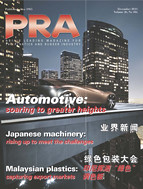 |
 |
In this Edition December 2011 |
LEAD FEATURE |
COMPANY NEWS |
MATERIALS NEWS |
MACHINERY NEWS |
INJECTION MOULDING ASIA |
RUBBER JOURNAL ASIA |
PRA December 2011 Electronic Issue Now Available |
Lead Feature
Portrait of 2011 and a glimpse into 2012
 |
But for Western machinery makers it was the best year with the Italian plastics and rubber machinery association Assocomaplast posting a higher sales growth of 11% aided by the export markets, especially China. Meanwhile, the German plastics and rubber machinery association VDMA raised its forecast for sales growth from 18 to 22% and a new all-time high of turnover of EUR6 billion. But VDMA anticipates a decline in sales of 7% in 2012, based on slower incoming orders.
Enter 2012 - the year of the dragon in Chinese astrology. In China, the dragon is the imperial symbol, the sign of the emperor or the male element yang. It is also a symbol of power and wealth. Hence, it is understandable that families will be expanding their families. In fact, a 5% baby boom is expected in the country, which may lead to increased demand for baby goods and trickle down to the plastics sector, too!
Flooding disrupts supply chain
2011 leaves behind a trail of destruction. Mother Nature unleashed her fury on the planet - with the earthquake in Japan that triggered a destructive tsunami, followed by unprecedented flooding in Thailand - its worst for a long time. According to experts, rapid urbanisation is a major reason why floods in Bangkok have gotten worse but this has not been helped by the heavy monsoon rains that claimed more than 1,000 lives across the region.
Thailand is an important base for Japanese automotives and appliances while the earthquake/tsunami stricken part of northern Japan has a relatively small size of manufacturing there.
The flooding in Thailand forced the closure of seven major industrial parks. According to Frost and Sullivan, nearly 10% of automotive parts are from the flooded areas of Ayutthaya and Pathum Thani that house nearly 40 automotive parts makers, thus disrupting the global supply chain. The waters have since receded but many areas still face a major clean-up operation.
Recently, Japanese car maker Honda started its clean up by destroying more than 1,000 flood-damaged cars to reassure customers that no vehicles damaged in the floods will be retailed. The scrapping process at Honda's plant in the Rojana Industrial Park in Ayutthaya is expected to take one month.
While Honda's supply has not been affected given that it has plants in other parts of the world, tyre maker Goodyear Tire & Rubber expects a global shortage of bias aviation tyres that may begin affecting the commercial airline industry in February or March 2012.
Meanwhile, the severe flooding hampered electronic parts production across the country that yields a quarter of the world's hard drives. According to International Data Corporation (IDC), this will have a direct impact on worldwide PC shipments through the first half of 2012.
PC manufacturers like Dell have warned the shortage of drives could lead to slower production while chip maker Marvell Technology Group revealed a cautious revenue. However, the company expects up to 10% of the lost hard-drive production to be recovered in the quarter ending in January 2012.
The bright spark from all this was the concerted efforts of companies like Thai blow moulding machinery maker SMC Corporation that raised more than 650,000 baht to purchase mini-boats/rafts during the flooding. SMC was fortunate that its plant was not affected and hence it wanted to do its bit for those who were affected, it said in a statement.
Enter the dragon
So what is in store for the plastic sector in 2012, which in Chinese astrology is the Year of the Dragon, starting on 23 January and ending on 9 February 2013?
A recent study undertaken by German research firm Ceresna says that in spite of the uncertain times and the gloomy mood in many other industrial sectors, companies in the chemical and plastic industries were optimistic about the last quarter 2011.
But almost one quarter of all surveyed companies anticipate their business situation will change for the worse over the next 6 to 12 months. In contrast, more than 43% expect an improvement. Petrochemical and manufacturers of plastics and elastomers have particularly positive expectations.
Ceresna says there is no evidence of a downturn in the chemical industry. Almost 80% of those companies that evaluated their current business situation as good do not expect this will change for the worse. Despite a uniformly positive mood, there are considerable regional differences in the assessment of business situation and outlook.
Hence, the good news is only for Asia as the business situation in Asia is expected to see particularly positive development, says Ceresna.
A survey conducted for its latest Ceresana Industry Monitor (CIM) was answered by plastics decision-makers in 46 countries. In Europe, the CIM Barometer score of 1.1 showed the level of uncertainty as a result of the Eurozone debt crisis. In contrast, in Asia Pacific, the CIM score showed 25.7. Hence, the upbeat mood for Asia is expected to continue to 2012.


